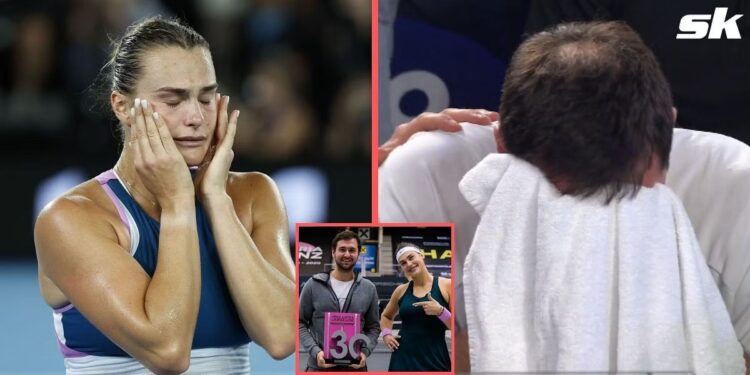“Maybe They Had Such a Fight that Elena Rybakina Approached WTA” – Aryna Sabalenka’s Coach Anton Dubrov Speculates about Stefano Vukov’s Reported Ban

Anton Dubrov, the coach of Aryna Sabalenka, recently stirred up the tennis world with his comments on the reported ban of Stefano Vukov, the former coach of reigning Wimbledon champion Elena Rybakina.
Dubrov’s remarks shed light on the potential internal strife and coaching controversies that have been brewing in Rybakina’s camp, which eventually led to her parting ways with Vukov.
During an interview, Dubrov hinted that the fallout between Rybakina and Vukov might have been severe enough to prompt the Kazakh star to approach the Women’s Tennis Association (WTA) for intervention, raising questions about Vukov’s conduct and his status within the organization.
### Background: Rybakina-Vukov Partnership
Elena Rybakina and Stefano Vukov enjoyed a highly successful partnership that saw Rybakina reach new heights in her career. Under Vukov’s guidance, Rybakina not only won her first Grand Slam title at Wimbledon in 2022 but also became one of the most consistent performers on the WTA Tour.
Their coach-player relationship was characterized by a mutual understanding of Rybakina’s playing style and Vukov’s ability to bring out the best in her during high-pressure situations.
However, tensions between the two began to surface publicly in early 2024. During several high-profile matches, viewers observed heated exchanges and instances where Rybakina appeared visibly frustrated with Vukov’s courtside demeanor.
Vukov’s intense coaching style and critical comments were criticized by fans and experts alike, who questioned whether it was affecting Rybakina’s performance and mental state. This scrutiny reached a peak at the Australian Open, where Rybakina’s body language suggested a disconnect between her and her coach.
### Dubrov’s Take on the Reported Ban
When asked about Vukov’s reported ban and his abrupt exit from the WTA circuit, Anton Dubrov did not hold back. “Maybe they had such a fight that Elena Rybakina approached WTA,” Dubrov speculated, suggesting that the split was not merely a professional decision but a response to a serious conflict between the two.
Dubrov’s comments imply that the rift between Rybakina and Vukov might have escalated to a level where external parties, such as the WTA, had to step in to mediate or address complaints raised by the player.
Dubrov’s words add a new dimension to the situation, as the WTA typically refrains from intervening in coach-player disputes unless there are allegations of misconduct or behavior that breaches the organization’s code of ethics.
If Rybakina did approach the WTA, it would suggest that there were deeper issues beyond tactical disagreements or performance concerns. It could potentially point to Vukov’s coaching methods or interactions with Rybakina being deemed inappropriate or harmful by the player.
### Rybakina’s Public Silence and Possible Concerns
Elena Rybakina has maintained a largely private stance on the matter, choosing not to publicly address the reasons behind her decision to part ways with Vukov.
While she acknowledged the success they achieved together, Rybakina did not provide any detailed explanation for the split, fueling further speculation about what might have transpired behind closed doors.
If Dubrov’s assertion holds any truth, it would explain Rybakina’s reluctance to elaborate on the situation, as approaching the WTA would have been a highly sensitive and potentially damaging move for both her and Vukov’s careers.
From a player’s perspective, approaching an organization like the WTA to intervene in a coach-player dispute is a significant step that indicates a serious breakdown in trust or safety.
It suggests that Rybakina may have felt her concerns were not being adequately addressed or that the situation had reached a point where she felt compelled to seek external support. Such a move would not have been taken lightly, especially considering the visibility and scrutiny it would attract.
### The Implications of a Potential Ban
The nature of the reported ban on Stefano Vukov remains unclear. It is not known whether the ban is temporary, pending investigation, or a long-term suspension that could affect Vukov’s ability to coach other players on the WTA Tour.
If Vukov is indeed banned, it would mark a rare instance of a high-profile coach being sanctioned by the WTA, setting a precedent for how the organization handles disputes and conduct issues involving coaches.
For Vukov, such a ban could have far-reaching consequences for his career. Known for his tactical acumen and ability to guide players to the highest level, Vukov’s reputation would be severely damaged if the ban is linked to allegations of misconduct.
It would also raise questions about his future in tennis and whether other players or teams would be willing to associate with him, given the circumstances surrounding his departure from Rybakina’s camp.
### Sabalenka and Dubrov’s Perspective on Coaching Relationships
Dubrov’s comments on the Rybakina-Vukov situation also reflect his perspective on coach-player dynamics. As the coach of World No. 1 Aryna Sabalenka, Dubrov emphasized the importance of maintaining a healthy and positive relationship between coach and player.
“It’s not just about tennis,” Dubrov remarked. “Coaching involves understanding the player’s mindset, respecting boundaries, and knowing when to push and when to step back.”
Sabalenka and Dubrov have cultivated a strong partnership based on open communication and mutual respect, which has been a cornerstone of Sabalenka’s success.
Dubrov’s approach is in stark contrast to the more authoritarian style reportedly employed by Vukov, highlighting the diverse coaching philosophies that exist on the WTA Tour.
### The Future for Rybakina and Vukov
As Elena Rybakina navigates her career without Stefano Vukov, she faces the challenge of finding a new coach who can help her build on her recent successes while ensuring a supportive and harmonious environment.
The Kazakh player’s talent and potential are undeniable, but the stability and guidance provided by the right coach will be crucial as she aims for continued success at the highest level.
For Vukov, the path forward is uncertain. If the reported ban is confirmed, he will need to address the reasons behind it and potentially seek to rehabilitate his image within the tennis community.
How he responds to this situation, and whether he can eventually return to coaching, will depend on the nature of the ban and his willingness to make changes to his approach, if necessary.
### Conclusion
Anton Dubrov’s speculation about Elena Rybakina approaching the WTA over Stefano Vukov’s reported ban adds a new layer of intrigue to an already complex and controversial situation.
While the true nature of the conflict remains unknown, Dubrov’s comments suggest that the split between Rybakina and Vukov was far from amicable and may have involved serious issues that warranted external intervention.
As more details emerge, the tennis world will be watching closely to see how Rybakina, Vukov, and the WTA respond to this unfolding story.









